人教新目标版英语八年级上Unit 1 Where did you go on vacation? Section A Grammar Focus-3c课件(共32张PPT无素材)
文档属性
| 名称 | 人教新目标版英语八年级上Unit 1 Where did you go on vacation? Section A Grammar Focus-3c课件(共32张PPT无素材) | 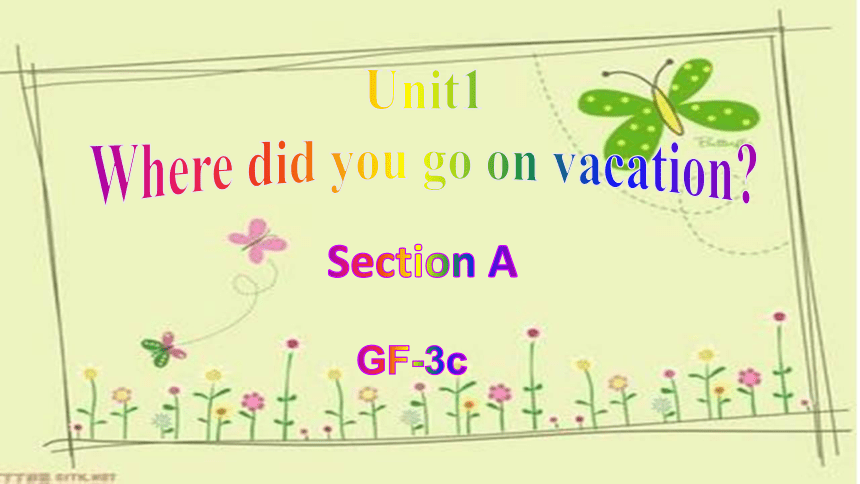 | |
| 格式 | zip | ||
| 文件大小 | 228.4KB | ||
| 资源类型 | 教案 | ||
| 版本资源 | 人教新目标(Go for it)版 | ||
| 科目 | 英语 | ||
| 更新时间 | 2020-09-05 23:03:36 | ||
图片预览

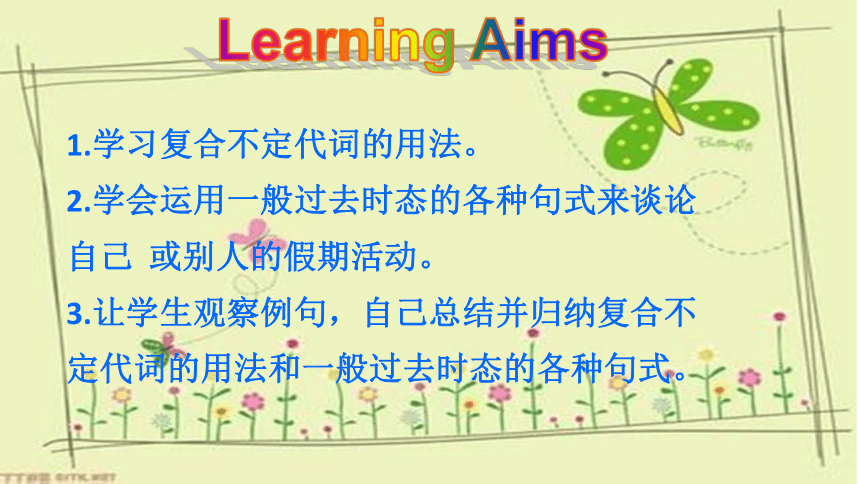
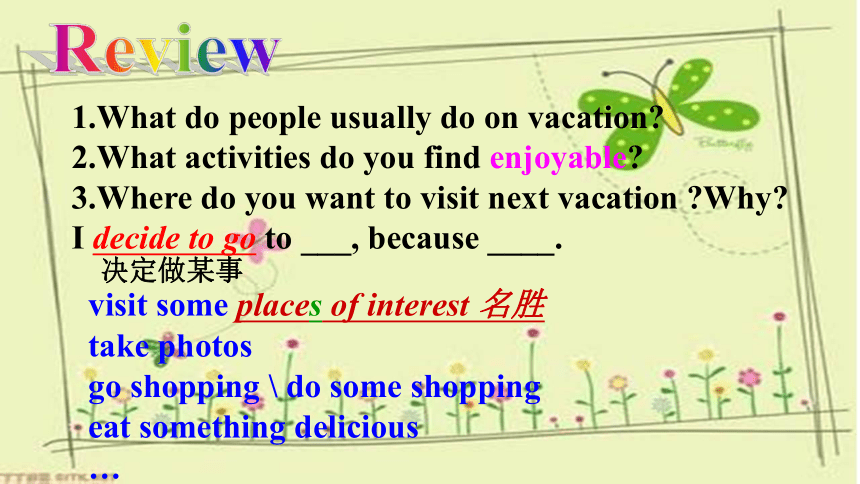
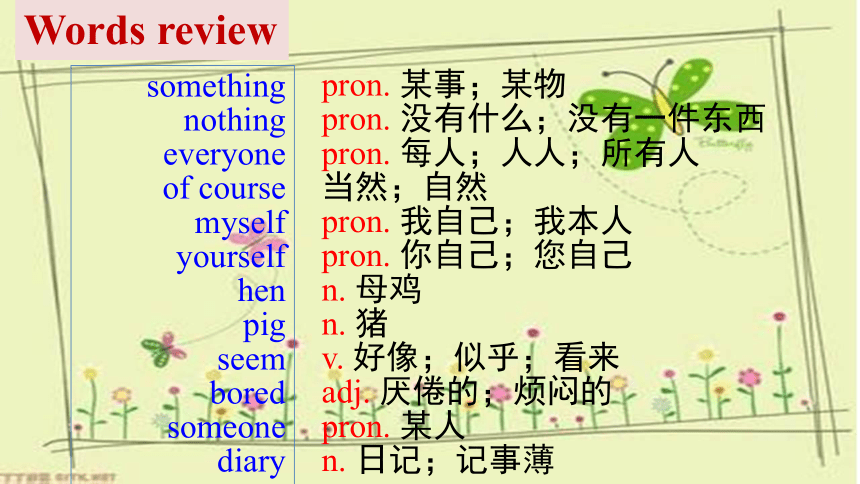
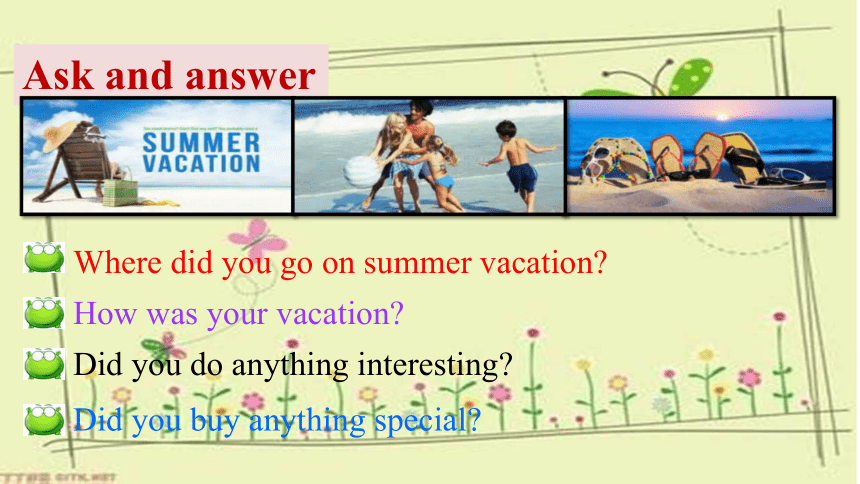
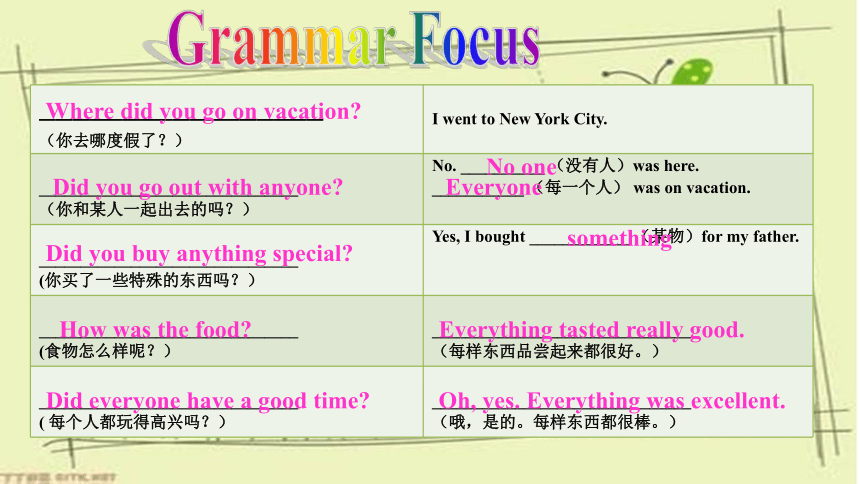
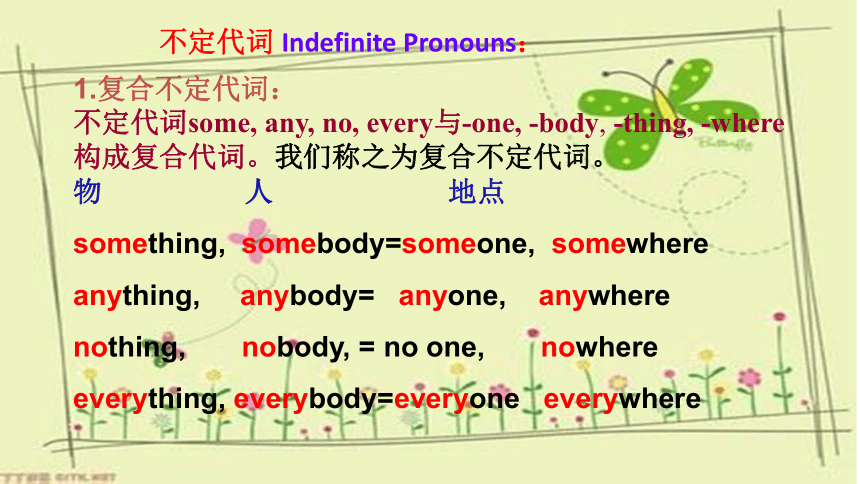
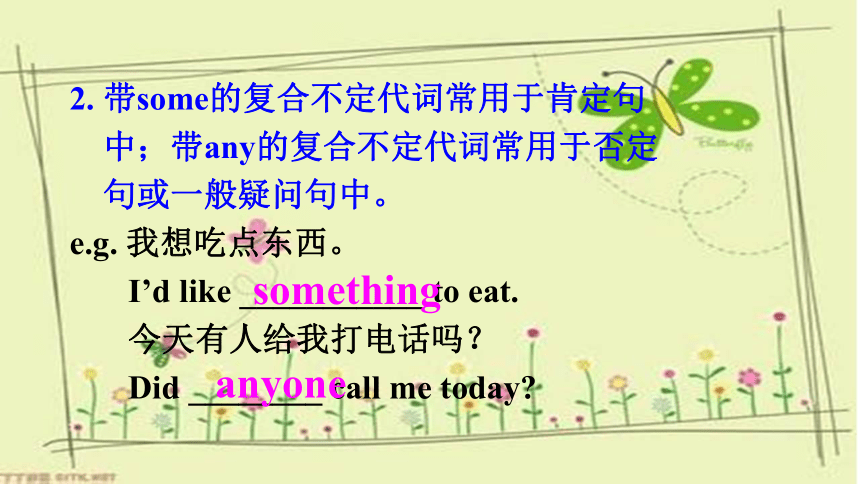
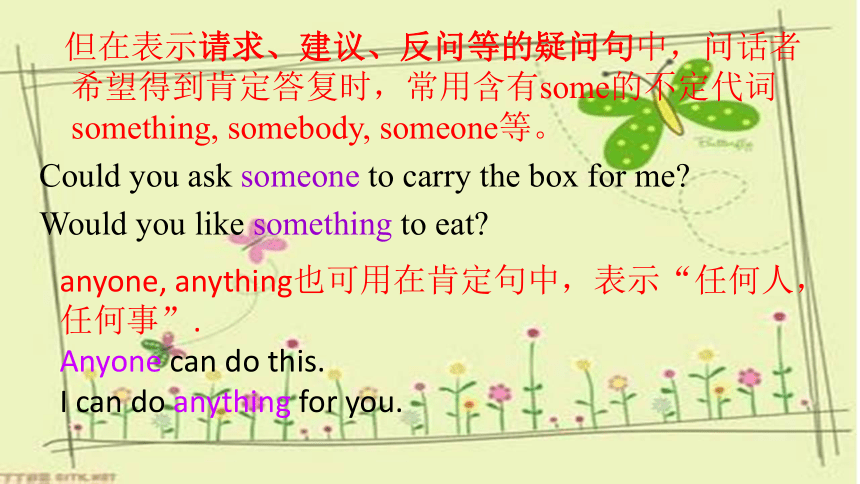
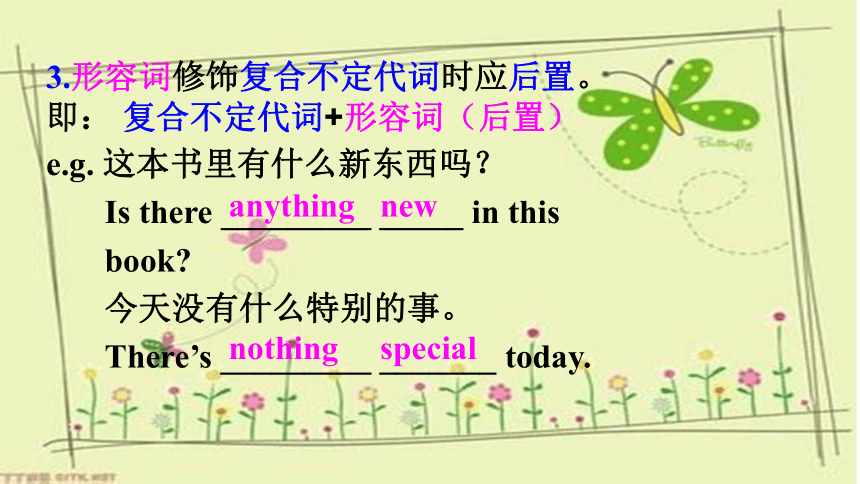
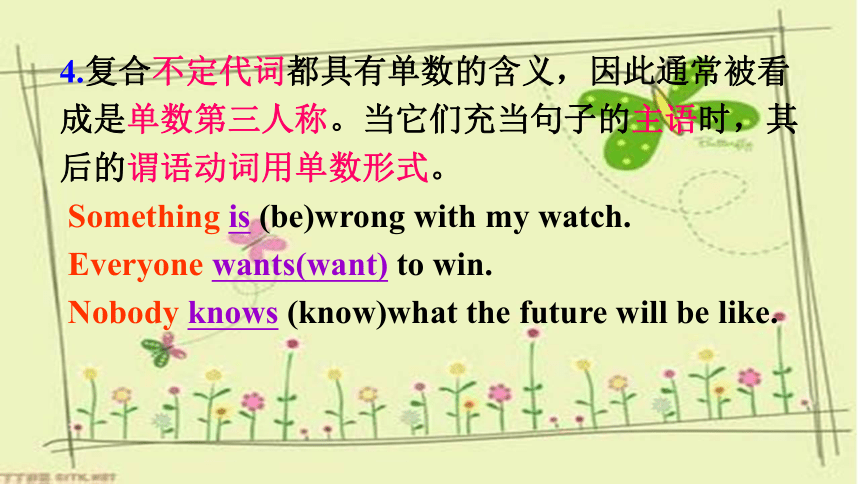
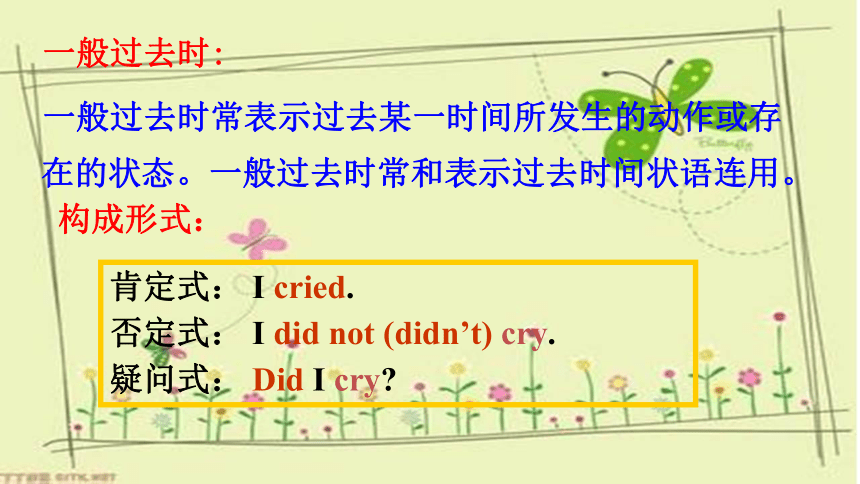
文档简介
(共32张PPT)
Section
A
Unit1
Where
did
you
go
on
vacation?
GF-3c
Learning
Aims
学习复合不定代词的用法。
学会运用一般过去时态的各种句式来谈论自己
或别人的假期活动。
让学生观察例句,自己总结并归纳复合不定代词的用法和一般过去时态的各种句式。
Review
What
do
people
usually
do
on
vacation?
What
activities
do
you
find
enjoyable?
Where
do
you
want
to
visit
next
vacation
?Why?
I
decide
to
go
to
___,
because
____.
visit
some
places
of
interest
名胜
take
photos
go
shopping
\
do
some
shopping
eat
something
delicious
…
决定做某事
Words
review
something
nothing
everyone
of
course
myself
yourself
hen
pig
seem
bored
someone
diary
pron.
某事;某物
pron.
没有什么;没有一件东西
pron.
每人;人人;所有人
当然;自然
pron.
我自己;我本人
pron.
你自己;您自己
n.
母鸡
n.
猪
v.
好像;似乎;看来
adj.
厌倦的;烦闷的
pron.
某人
n.
日记;记事薄
Ask
and
answer
Where
did
you
go
on
summer
vacation?
How
was
your
vacation?
Did
you
do
anything
interesting?
Did
you
buy
anything
special?
Grammar
Focus
—————————————————
(你去哪度假了?)
I
went
to
New
York
City.
_______________________________
(你和某人一起出去的吗?)
No.
__________
(没有人)was
here.
___________
(每一个人)
was
on
vacation.
_______________________________
(你买了一些特殊的东西吗?)
Yes,
I
bought
____________
(某物)for
my
father.
_______________________________
(食物怎么样呢?)
_______________________________
(每样东西品尝起来都很好。)
_______________________________
(
每个人都玩得高兴吗?)
_______________________________
(哦,是的。每样东西都很棒。)
Where
did
you
go
on
vacation?
Did
you
go
out
with
anyone?
No
one
Everyone
Did
you
buy
anything
special?
something
How
was
the
food?
Everything
tasted
really
good.
Did
everyone
have
a
good
time?
Oh,
yes.
Everything
was
excellent.
1.复合不定代词:
物
人
地点
something,
somebody=someone,
somewhere
anything,
anybody=
anyone,
anywhere
nothing,
nobody,
=
no
one,
nowhere
everything,
everybody=everyone
everywhere
不定代词
Indefinite
Pronouns:
不定代词some,
any,
no,
every与-one,
-body,
-thing,
-where构成复合代词。我们称之为复合不定代词。
2.
带some的复合不定代词常用于肯定句
中;带any的复合不定代词常用于否定
句或一般疑问句中。
e.g.
我想吃点东西。
I’d
like
___________
to
eat.
今天有人给我打电话吗?
Did
________
call
me
today?
anyone
something
但在表示请求、建议、反问等的疑问句中,问话者希望得到肯定答复时,常用含有some的不定代词something,
somebody,
someone等。
Could
you
ask
someone
to
carry
the
box
for
me?
Would
you
like
something
to
eat?
anyone,
anything也可用在肯定句中,表示“任何人,任何事”.
Anyone
can
do
this.
I
can
do
anything
for
you.
3.形容词修饰复合不定代词时应后置。
即:
复合不定代词+形容词(后置)
e.g.
这本书里有什么新东西吗?
Is
there
_________
_____
in
this
book?
今天没有什么特别的事。
There’s
_________
_______
today.
anything
new
nothing
special
4.复合不定代词都具有单数的含义,因此通常被看成是单数第三人称。当它们充当句子的主语时,其后的谓语动词用单数形式。
Something
is
(be)wrong
with
my
watch.
Everyone
wants(want)
to
win.
Nobody
knows
(know)what
the
future
will
be
like.
一般过去时:
一般过去时常表示过去某一时间所发生的动作或存在的状态。一般过去时常和表示过去时间状语连用。
构成形式:
肯定式:
I
cried.
否定式:
I
did
not
(didn’t)
cry.
疑问式:
Did
I
cry?
1、一般加ed
:
visit
-
visited
2、以e结尾的加d:
dance
-
danced
3、以辅音字母加y结尾的改y为i加ed:
study
-
studied
4、以辅元辅结尾的重读闭音节,双写末尾的
辅音字母加ed:
stop
-
stopped
过去式动词的变化
规则变化
(regular
change)
不规则变化
(irregular
change)
1、没有变化,如:
cut
-cut
,let-let,read-read
2、改变元音的,如:
write
-
wrote
3、元音和辅音都有改变的,如:
buy
-
bought
常用动词及其过去式(不规则)
am/is
are
bring
buy
come
do
draw
drink
eat
feel
fight
fly
get
go
grow
have
keep
know
leave
lose
make
meet
pay
read
ride
run
say
see
sell
sing
sit
sleep
speak
spend
stand
swim
take
teach
tell
think
wear
write
was
were
brought
bought
came
did
drew
drank
ate
felt
fought
flew
got
went
grew
had
kept
knew
left
lost
made
met
paid
read
rode
ran
said
saw
sold
sang
sat
slept
spoke
spent
stood
swam
took
taught
told
thought
wore
wrote
3a
Fill
in
the
blanks
with
the
words
in
the
box
and
practice
the
conversation.
anyone,
something,
anything,
everything,
nothing
Linda:
Did
you
do
_________
fun
on
your
vacation,
Alice?
Alice:
Yes,
I
did.
I
went
to
Sanya.
Linda:
How
did
you
like
it?
Alice:
Well,
it
was
my
first
time
there,
so
__________
was
really
interesting.
Linda:
Did
you
go
with
________?
Alice:
Yes,
I
did.
I
went
with
my
sister.
Linda:
Did
you
go
shopping?
anything
everything
anyone
Alice:
Of
course!
I
bought
_________
for
my
parents,
but
______
for
myself.
Linda:
Why
didn’t
you
buy
________
for
yourself?
Alice:
I
didn’t
really
see
_______
I
liked.
something
nothing
anything
anything
Practice
anything,
everything,
nothing,
everyone,
no
one
Fill
in
the
blanks
in
the
email
message
with
the
words
in
the
box.
3b
Fill
in
the
blanks
in
the
email
message
with
the
words
in
the
box.
3b
Dear
Bill,
How
was
your
vacation?
Did
you
do
_______
interesting?
Did
________
in
your
family
go
with
you?
I
went
to
a
friend’s
farm
in
the
countryside
with
my
family.
_________
was
great.
We
fed
some
hens
and
saw
some
baby
pigs.
They
were
so
cute!
The
only
problem
was
that
there
was
_______
much
to
do
in
the
evening
but
read.
Still
_________
seemed
to
be
bored.
Bye
for
now.
anything
Everything
anyone
nothing
no
one
3c
Did
you…
Everyone
Someone
(name)
No
one
Eat
anything
at
a
restaurant?
Read
anything
interesting?
Visit
anyone
in
your
family?
Buy
anything?
Keep
a
diary?
Ask
your
group
questions
about
their
last
vacation.
Then
tell
the
class
your
results.
我都
学会了!
本课句型
Summary
复合不定代词的用法。
运用一般过去时态的各种句式来谈论自己
或别人的假期活动。
自己总结并归纳复合不定代词的用法和一般过去时态的各种句式。
Exercises
一、词形变化
stay
(过去式
)________
study(过去式)
________
feed
(过去式)
________
see
(过去式)
________
take
(过去式)
________
try
(过去式)
_____(三单)_____(现在分词)______
different
(名词)
_________
build(过去式)_______
(名词)
_________
dry
(反义词)
______
________
full
(反义词)
________
__________
stayed
studied
fed
saw
took
difference
tried
building
wet
hungry
tries
trying
built
empet空地
humid
二根据汉语提示完成句子。
1.
Did
he
go
out
with
_________
(任何人)?
2.
They
didn’t
buy
_______
_______
(特殊的东西)
there
yesterday.
3.
Tell
us
__________
__________
(有趣的事情)
about
your
vacation,
Jenny.
anyone
something
interesting
anything
special
4.
They
caught
_______
___
_____
(相当多的)
insects
in
the
forest.
5.
_____
__
___
(大多数)
students
can
get
to
school
early.
quite
a
few
Most
of
the
三、单项填空。
(
)1.
The
old
man
really
enjoys
_____
around
the
school
after
dinner.
walking
B.
to
walk
C.
walks
D.
walked
A
(
)2.
Where
_____
you
_____
on
vacation
last
year?
do;
go
B.
are;
went
C.
did;
go
D.
were;
went
C
(
)3.
—I
don’t
like
this
bag.
Can
you
show
me
_____
one?
—Yes.
Here
you
are.
other
B.
the
other
C.
another
D.
others
C
(
)4.
I
don’t
have
_money,so
I
didn’t
buy
it
at
that
time.
little
B.
enough
C.
a
little
D.
a
few
(
)5.
You
should
cook
for
__when
your
parents
go
out.
herself
B.
myself
C.
yourself
D.
himself
B
C
四、根据汉语意思完成下列句子。
1.我为妈妈的生日买了特别的东西。
I
bought
___________________my
mother's
birthday.
2.这种蛋糕尝起来的确很可口。
This
kind
of
cake
_______________.
3.机器人所做的工作似乎很令人厌倦。
The
work
that
robots
do
________be
boring.
4.他们需要找个地方过夜吗?
Do
they
need
___________stay
for
the
night?
5.记日记是一个好习惯。
It
is
a
good
habit
_____________.
something
special
for
tastes
really
good
seems
to
anywhere
to
to
keep
a
diary
Homework
1.
Make
a
survey
about
what
your
friends
did
on
vacation.
3.
Preview
SectionB
(1a-1e).
Thank
you
!
Section
A
Unit1
Where
did
you
go
on
vacation?
GF-3c
Learning
Aims
学习复合不定代词的用法。
学会运用一般过去时态的各种句式来谈论自己
或别人的假期活动。
让学生观察例句,自己总结并归纳复合不定代词的用法和一般过去时态的各种句式。
Review
What
do
people
usually
do
on
vacation?
What
activities
do
you
find
enjoyable?
Where
do
you
want
to
visit
next
vacation
?Why?
I
decide
to
go
to
___,
because
____.
visit
some
places
of
interest
名胜
take
photos
go
shopping
\
do
some
shopping
eat
something
delicious
…
决定做某事
Words
review
something
nothing
everyone
of
course
myself
yourself
hen
pig
seem
bored
someone
diary
pron.
某事;某物
pron.
没有什么;没有一件东西
pron.
每人;人人;所有人
当然;自然
pron.
我自己;我本人
pron.
你自己;您自己
n.
母鸡
n.
猪
v.
好像;似乎;看来
adj.
厌倦的;烦闷的
pron.
某人
n.
日记;记事薄
Ask
and
answer
Where
did
you
go
on
summer
vacation?
How
was
your
vacation?
Did
you
do
anything
interesting?
Did
you
buy
anything
special?
Grammar
Focus
—————————————————
(你去哪度假了?)
I
went
to
New
York
City.
_______________________________
(你和某人一起出去的吗?)
No.
__________
(没有人)was
here.
___________
(每一个人)
was
on
vacation.
_______________________________
(你买了一些特殊的东西吗?)
Yes,
I
bought
____________
(某物)for
my
father.
_______________________________
(食物怎么样呢?)
_______________________________
(每样东西品尝起来都很好。)
_______________________________
(
每个人都玩得高兴吗?)
_______________________________
(哦,是的。每样东西都很棒。)
Where
did
you
go
on
vacation?
Did
you
go
out
with
anyone?
No
one
Everyone
Did
you
buy
anything
special?
something
How
was
the
food?
Everything
tasted
really
good.
Did
everyone
have
a
good
time?
Oh,
yes.
Everything
was
excellent.
1.复合不定代词:
物
人
地点
something,
somebody=someone,
somewhere
anything,
anybody=
anyone,
anywhere
nothing,
nobody,
=
no
one,
nowhere
everything,
everybody=everyone
everywhere
不定代词
Indefinite
Pronouns:
不定代词some,
any,
no,
every与-one,
-body,
-thing,
-where构成复合代词。我们称之为复合不定代词。
2.
带some的复合不定代词常用于肯定句
中;带any的复合不定代词常用于否定
句或一般疑问句中。
e.g.
我想吃点东西。
I’d
like
___________
to
eat.
今天有人给我打电话吗?
Did
________
call
me
today?
anyone
something
但在表示请求、建议、反问等的疑问句中,问话者希望得到肯定答复时,常用含有some的不定代词something,
somebody,
someone等。
Could
you
ask
someone
to
carry
the
box
for
me?
Would
you
like
something
to
eat?
anyone,
anything也可用在肯定句中,表示“任何人,任何事”.
Anyone
can
do
this.
I
can
do
anything
for
you.
3.形容词修饰复合不定代词时应后置。
即:
复合不定代词+形容词(后置)
e.g.
这本书里有什么新东西吗?
Is
there
_________
_____
in
this
book?
今天没有什么特别的事。
There’s
_________
_______
today.
anything
new
nothing
special
4.复合不定代词都具有单数的含义,因此通常被看成是单数第三人称。当它们充当句子的主语时,其后的谓语动词用单数形式。
Something
is
(be)wrong
with
my
watch.
Everyone
wants(want)
to
win.
Nobody
knows
(know)what
the
future
will
be
like.
一般过去时:
一般过去时常表示过去某一时间所发生的动作或存在的状态。一般过去时常和表示过去时间状语连用。
构成形式:
肯定式:
I
cried.
否定式:
I
did
not
(didn’t)
cry.
疑问式:
Did
I
cry?
1、一般加ed
:
visit
-
visited
2、以e结尾的加d:
dance
-
danced
3、以辅音字母加y结尾的改y为i加ed:
study
-
studied
4、以辅元辅结尾的重读闭音节,双写末尾的
辅音字母加ed:
stop
-
stopped
过去式动词的变化
规则变化
(regular
change)
不规则变化
(irregular
change)
1、没有变化,如:
cut
-cut
,let-let,read-read
2、改变元音的,如:
write
-
wrote
3、元音和辅音都有改变的,如:
buy
-
bought
常用动词及其过去式(不规则)
am/is
are
bring
buy
come
do
draw
drink
eat
feel
fight
fly
get
go
grow
have
keep
know
leave
lose
make
meet
pay
read
ride
run
say
see
sell
sing
sit
sleep
speak
spend
stand
swim
take
teach
tell
think
wear
write
was
were
brought
bought
came
did
drew
drank
ate
felt
fought
flew
got
went
grew
had
kept
knew
left
lost
made
met
paid
read
rode
ran
said
saw
sold
sang
sat
slept
spoke
spent
stood
swam
took
taught
told
thought
wore
wrote
3a
Fill
in
the
blanks
with
the
words
in
the
box
and
practice
the
conversation.
anyone,
something,
anything,
everything,
nothing
Linda:
Did
you
do
_________
fun
on
your
vacation,
Alice?
Alice:
Yes,
I
did.
I
went
to
Sanya.
Linda:
How
did
you
like
it?
Alice:
Well,
it
was
my
first
time
there,
so
__________
was
really
interesting.
Linda:
Did
you
go
with
________?
Alice:
Yes,
I
did.
I
went
with
my
sister.
Linda:
Did
you
go
shopping?
anything
everything
anyone
Alice:
Of
course!
I
bought
_________
for
my
parents,
but
______
for
myself.
Linda:
Why
didn’t
you
buy
________
for
yourself?
Alice:
I
didn’t
really
see
_______
I
liked.
something
nothing
anything
anything
Practice
anything,
everything,
nothing,
everyone,
no
one
Fill
in
the
blanks
in
the
message
with
the
words
in
the
box.
3b
Fill
in
the
blanks
in
the
message
with
the
words
in
the
box.
3b
Dear
Bill,
How
was
your
vacation?
Did
you
do
_______
interesting?
Did
________
in
your
family
go
with
you?
I
went
to
a
friend’s
farm
in
the
countryside
with
my
family.
_________
was
great.
We
fed
some
hens
and
saw
some
baby
pigs.
They
were
so
cute!
The
only
problem
was
that
there
was
_______
much
to
do
in
the
evening
but
read.
Still
_________
seemed
to
be
bored.
Bye
for
now.
anything
Everything
anyone
nothing
no
one
3c
Did
you…
Everyone
Someone
(name)
No
one
Eat
anything
at
a
restaurant?
Read
anything
interesting?
Visit
anyone
in
your
family?
Buy
anything?
Keep
a
diary?
Ask
your
group
questions
about
their
last
vacation.
Then
tell
the
class
your
results.
我都
学会了!
本课句型
Summary
复合不定代词的用法。
运用一般过去时态的各种句式来谈论自己
或别人的假期活动。
自己总结并归纳复合不定代词的用法和一般过去时态的各种句式。
Exercises
一、词形变化
stay
(过去式
)________
study(过去式)
________
feed
(过去式)
________
see
(过去式)
________
take
(过去式)
________
try
(过去式)
_____(三单)_____(现在分词)______
different
(名词)
_________
build(过去式)_______
(名词)
_________
dry
(反义词)
______
________
full
(反义词)
________
__________
stayed
studied
fed
saw
took
difference
tried
building
wet
hungry
tries
trying
built
empet空地
humid
二根据汉语提示完成句子。
1.
Did
he
go
out
with
_________
(任何人)?
2.
They
didn’t
buy
_______
_______
(特殊的东西)
there
yesterday.
3.
Tell
us
__________
__________
(有趣的事情)
about
your
vacation,
Jenny.
anyone
something
interesting
anything
special
4.
They
caught
_______
___
_____
(相当多的)
insects
in
the
forest.
5.
_____
__
___
(大多数)
students
can
get
to
school
early.
quite
a
few
Most
of
the
三、单项填空。
(
)1.
The
old
man
really
enjoys
_____
around
the
school
after
dinner.
walking
B.
to
walk
C.
walks
D.
walked
A
(
)2.
Where
_____
you
_____
on
vacation
last
year?
do;
go
B.
are;
went
C.
did;
go
D.
were;
went
C
(
)3.
—I
don’t
like
this
bag.
Can
you
show
me
_____
one?
—Yes.
Here
you
are.
other
B.
the
other
C.
another
D.
others
C
(
)4.
I
don’t
have
_money,so
I
didn’t
buy
it
at
that
time.
little
B.
enough
C.
a
little
D.
a
few
(
)5.
You
should
cook
for
__when
your
parents
go
out.
herself
B.
myself
C.
yourself
D.
himself
B
C
四、根据汉语意思完成下列句子。
1.我为妈妈的生日买了特别的东西。
I
bought
___________________my
mother's
birthday.
2.这种蛋糕尝起来的确很可口。
This
kind
of
cake
_______________.
3.机器人所做的工作似乎很令人厌倦。
The
work
that
robots
do
________be
boring.
4.他们需要找个地方过夜吗?
Do
they
need
___________stay
for
the
night?
5.记日记是一个好习惯。
It
is
a
good
habit
_____________.
something
special
for
tastes
really
good
seems
to
anywhere
to
to
keep
a
diary
Homework
1.
Make
a
survey
about
what
your
friends
did
on
vacation.
3.
Preview
SectionB
(1a-1e).
Thank
you
!
同课章节目录
- Unit 1 Where did you go on vacation?
- Section A
- Section B
- Unit 2 How often do you exercise?
- Section A
- Section B
- Unit 3 I'm more outgoing than my sister.
- Section A
- Section B
- Unit 4 What's the best movie theater?
- Section A
- Section B
- Unit 5 Do you want to watch a game show?
- Section A
- Section B
- Unit 6 I'm going to study computer science.
- Section A
- Section B
- Unit 7 Will people have robots?
- Section A
- Section B
- Unit 8 How do you make a banana milk shake?
- Section A
- Section B
- Unit 9 Can you come to my party?
- Section A
- Section B
- Unit 10 If you go to the party, you'll have a grea
- Section A
- Section B
